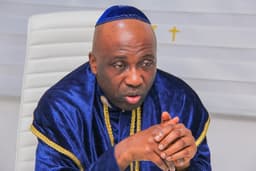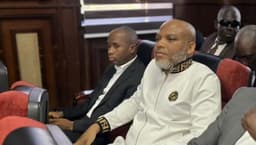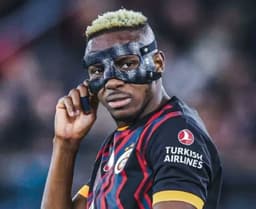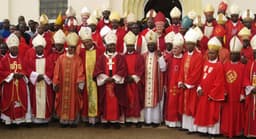
1994 Super Eagles squad
From the sunlit pitches of Tunisia to the global stage in the United States, Nigeria?s Golden Generation of 1994 gave the continent a new blueprint for excellence. But as time marched on, the harsh reality of mortality has slowly dimmed the brilliance of that era, with six iconic members of the squad now gone. In this commemorative piece, OLAMIDE ABE writes on the lives, achievements, and lasting legacies of these six fallen heroes
Uche Okafor (2011)
Okafor was a composed and commanding centre-back who epitomised defensive discipline and football intelligence. He earned 34 caps for the Super Eagles and was a key figure in the team?s historic 1994 AFCON campaign, starting in all five matches as Nigeria stormed to their second continental title. His positional sense and aerial prowess gave Nigeria vital defensive balance, forming an imperious backline alongside Stephen Keshi and Benedict Iroha.
Though he was included in the squad for the 1994 World Cup in the United States, Okafor did not get any playing time, having suffered an ankle injury shortly after the AFCON. Nevertheless, his inclusion reflected the trust manager Clemens Westerhof placed in him. Four years later, he featured once in Nigeria?s 1998 World Cup campaign, coming on as a substitute against Denmark.After retirement, Okafor settled in the United States, where he built a life dedicated to nurturing young talent and analysing football as a pundit. He worked with youth academies and offered coaching guidance in Dallas, Texas. Tragically, on January 6, 2011, he was found dead in his Texas home. Authorities ruled his death a suicide, but his family vehemently contested the verdict, suspecting foul play. He was 43 years old, and his death marked the first loss from the golden 1994 squad.
Rashidi Yekini (2012)
No name from Nigeria?s 1994 squad resonates with more acclaim than Yekini. He was the spearhead of the Nigerian attack for nearly a decade, embodying strength, hunger and a lethal touch in front of goal. He scored 37 goals in 62 appearances for the national team, a record that still stands as the highest in Nigerian history.At the 1994 AFCON in Tunisia, Yekini was irrepressible. His five goals led all scorers and propelled Nigeria to glory. He was named best player of the tournament, confirming his status as the continent?s finest striker. Months later, he put his name into global consciousness at the FIFA World Cup with his tap-in opener against Bulgaria, followed by a net-grabbing celebration in tears, which remains one of the World Cup?s most iconic images. Yekini had arrived, and so had Nigeria.
Throughout his career, he played in Ivory Coast, Portugal, Spain, Greece and Switzerland, with remarkable stints at Vit?ria Set?bal and Olympiacos that saw him winning the African Footballer of the Year award in 1993, the first Nigerian to achieve the feat.
Despite his success, Yekini?s post-retirement years were difficult. He lived a reclusive life in Ibadan and was reported to be battling mental health issues, including suspected bipolar disorder. He died on May 4 2012, at the age of 48.
Thompson Oliha (2013)
A midfield technician of great promise, Oliha rose through Nigeria?s football ranks with elegance and effectiveness. He earned 31 caps and scored two goals for the Super Eagles, but his importance extended beyond statistics. A dependable link between defence and attack, Oliha?s reading of the game and composure on the ball helped Nigeria maintain shape and tempo, particularly during the build-up to the 1994 triumph.
He featured in the 1994 World Cup as a late substitute in the round of 16 match against Italy. Although that would be his final appearance in a Nigerian jersey, his earlier contributions, especially in qualifiers and preparatory tournaments, were instrumental in shaping the chemistry of the team.
After hanging up his boots, Oliha transitioned into coaching and dedicated his post-playing career to youth development. At the time of his death, he was serving as an assistant coach at Kwara Football Academy, mentoring the next generation of Nigerian footballers.
Oliha died on June 30 2013, from complications related to malaria at 44.Wilfred Agbonavbare (2015)
Agbonavbare was a gentle giant whose goalkeeping heroics earned admiration both in Nigeria and in Spain. He rose through the ranks with the Flying Eagles before earning senior team recognition. At the 1994 AFCON and the World Cup later that year, he served as a reliable back-up to first-choice Peter Rufai, which reflects the depth of talent Nigeria possessed at the time.
Agbonavbare?s club career took off in Spain, where he starred for Rayo Vallecano. Between 1990 and 1996, he made nearly 200 appearances, becoming a cult hero for his consistency, bravery and reflexes. He settled in Madrid after retirement, working as a porter, delivery man and youth coach.
In 2014, it was revealed that Agbonavbare was suffering from cancer. His condition sparked an outpouring of support from fans and clubs, including a moving tribute from Atl?tico Madrid and Rayo Vallecano, whose players displayed a giant ?Fuerza Wilfred? banner before their La Liga match.
He died on January 27 2015, at the age of 48, succumbing to the illness after a prolonged battle. Agbonavbare?s death was mourned deeply both in Nigeria and Spain, where he had become a symbol of perseverance and professionalism.
Stephen Keshi (2016)
Keshi was the captain, the backbone, and the strategist of the 1994 golden generation. He represented Nigeria 64 times, scoring nine goals, a remarkable tally for a central defender. His leadership was instrumental in Nigeria?s AFCON success and their impressive World Cup debut.
Keshi had already carved out a legendary playing career by the early 1990s, having captained Nigeria to a third-place finish at the 1992 AFCON and led a band of Europe-based players who gave the Super Eagles a new level of professionalism. He was the first Nigerian player to play in Belgium and France, and his influence stretched far beyond the pitch.
Following retirement, Keshi took up coaching and made history in 2013 by guiding Nigeria to yet another AFCON title, becoming only the second person to win the trophy as both player and manager. His coaching career also included stints with Togo, whom he led to their first World Cup qualification in 2006.
On June 7 2016, Keshi died of a heart attack in Benin City, aged 54. His passing came barely six months after the death of his wife. His death was not just seen as a loss to Nigeria but to African football at large as he was a symbol of transformation, a leader of men and a proud son of the continent.
Peter Rufai (2025)
Fondly remembered as ?Dodo Mayana?, Rufai was Nigeria?s last line of defence during their most glorious football era. He earned 65 caps for the Super Eagles and was the country?s first-choice goalkeeper at both the 1994 and 1998 World Cups. At the 1994 AFCON, his commanding presence and agility between the posts played a pivotal role in Nigeria?s title win.
Uniquely, Rufai scored a penalty in a 1993 qualifier of the tournament against Ethiopia, becoming the only Nigerian goalkeeper to register a goal in an international match. His club career spanned stints in Belgium, the Netherlands, Portugal and Spain, most notably with Deportivo La Coru?a. Beyond the pitch, he was known for his royal lineage as the son of a traditional ruler, a title he graciously declined following his father?s death.
After retirement, Rufai remained involved in football development, inspiring young keepers and offering mentorship across various platforms. On July 3, 2025, he passed away after an illness at the age of 61. Rufai?s death closed yet another chapter of Nigeria?s golden generation, silencing a voice that once roared with leadership and unmatched reflexes. (PUNCH)



























NEWS EXPRESS is Nigeria’s leading online newspaper. Published by Africa’s international award-winning journalist, Mr. Isaac Umunna, NEWS EXPRESS is Nigeria’s first truly professional online daily newspaper. It is published from Lagos, Nigeria’s economic and media hub, and has a provision for occasional special print editions. Thanks to our vast network of sources and dedicated team of professional journalists and contributors spread across Nigeria and overseas, NEWS EXPRESS has become synonymous with newsbreaks and exclusive stories from around the world.